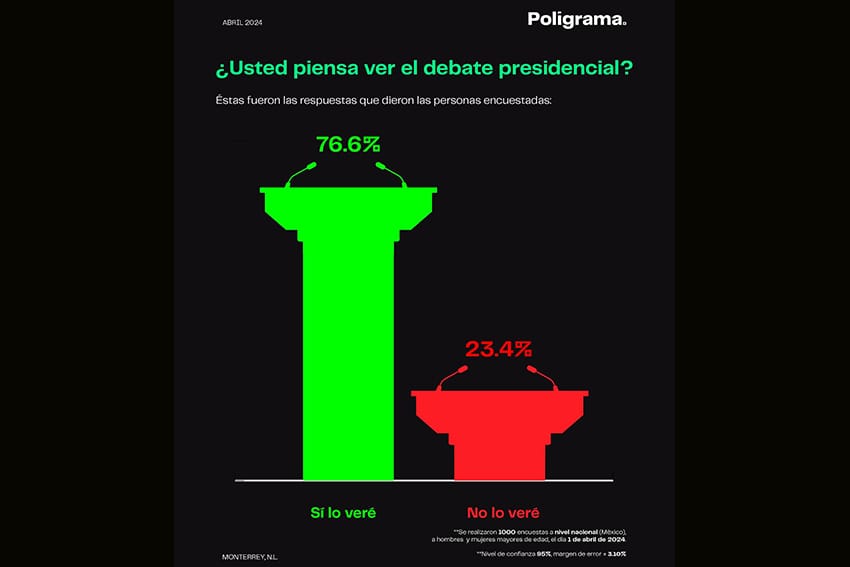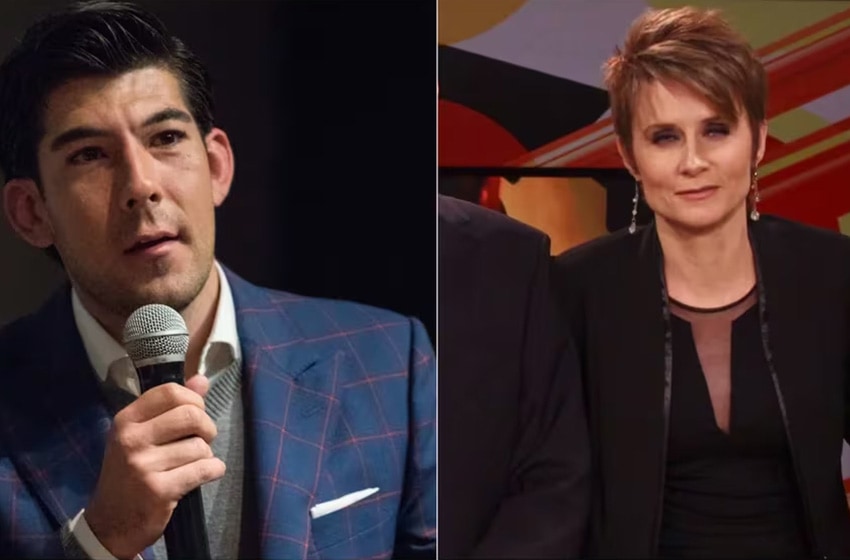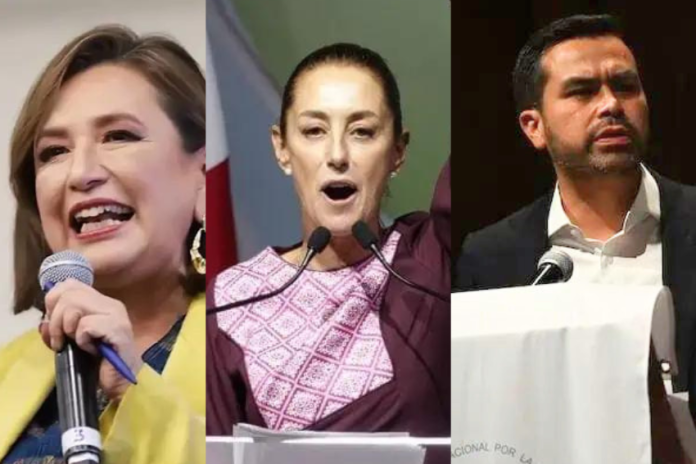A survey published this week by polling company Poligrama indicates that 76.6% of Mexicans are planning to watch Mexico’s first 2024 presidential debate — but that 60.5% don’t know when it’s taking place.
For the record, the date and time is this Sunday at 8 p.m. Mexico City time, and the participants will be Claudia Sheinbaum, Xóchitl Gálvez and Jorge Álvarez Máynez. Taking place in Mexico City, it will be the first of three scheduled debates before voters go to the polls on June 2 to elect a successor to President Andrés Manuel López Obrador.

According to the Bloomberg Poll Tracker, Sheinbaum leads with 58% of effective votes, comfortably ahead of Gálvez (35%) and underdog Álvarez Máynez (7%). Bloomberg’s tracker, based on data through March 31, excludes undecided voters and those who declined to answer.
Sheinbaum is the candidate for the coalition formed by the ruling Morena party with the Labor Party (PT) and the Ecological Green Party of Mexico (PVEM). Gálvez, a former senator, is representing the three-party opposition alliance made up of the National Action Party (PAN), the Institutional Revolutionary Party (PRI) and the Democratic Revolution Party (PRD), called Strength and Heart for Mexico.
Álvarez Máynez, a former member of the Chamber of Deputies, joined the race as the Citizens Movement (MC) party candidate after Nuevo León Governor Samuel García withdrew.
Poligrama’s survey, based in Monterrey, Nuevo León, revealed some other statistics regarding the upcoming debate: almost 1 out of 4 people said they will not watch it; 60% said that they will not change their opinion after watching it; and 20% said they have never seen a presidential debate.
The survey was conducted through 1,000 nationwide telephone calls on April 1 and has a margin of error of 3.1%.
The first debate will be organized by the National Electoral Institute (INE) and held at its headquarters, and can be streamed live on the INE’s official YouTube channel or viewed on various television stations including: Las estrellas (Canal 2), Canal 5, Azteca 7, Azteca uno, A+, ADN40, Cadena Tres, Imagen TV and Excélsior TV.

Earlier this year, the INE’s Debates Commission said citizens could send in their questions, which would then be processed by the Signa Lab of ITESO, the Jesuit University of Guadalajara. As of Wednesday, 108 questions of the 24,000 received had been forwarded to the moderators, former Televisa newscaster Denise Maerker and internet journalist Manuel López San Martín, who will choose the 30 questions they consider most relevant.
Sheinbaum and Morena have opposed the involvement of Signa Lab in the processing of the debate questions. In February, party officials pointed to previous social media posts of its director, Rossana Reguillo, that they said were critical of the Morena party’s policies and supported Gálvez’s candidacy. Reguillo subsequently distanced herself from the selection process.
The theme of this debate will be “the society we want” and will include topics related to education, health, transparency, combating corruption, anti-discrimination measures, vulnerable groups and violence against women.
The day after the debate, the Mexico Institute, of the Washington, D.C-based Wilson Center, will host a free, 90-minute online forum on the event from 3–4:30 p.m. Eastern Time. Participants will include members of Mexico’s Congress who are aligned with each candidate.
Mexico will have its largest election ever on June 2, with 20,375 federal positions up for grabs — including the presidency, 500 seats in the Chamber of Deputies and 128 in the Senate — and elections in nine state governments.
The second presidential debate, on April 28 at Estudios Churubusco in Mexico City, will include video-recorded citizen questions, and the focus will be on economic growth, employment and inflation, infrastructure and development, poverty and inequality, and climate change and sustainable development.
The final debate is scheduled for May 19 at the Centro Cultural Universitario Tlatelolco. It will address social policy; insecurity and organized crime; migration and foreign policy; and democracy, pluralism and the division of powers.
With reports from Aristegui Noticias, Heraldo de México, AS México and El País
